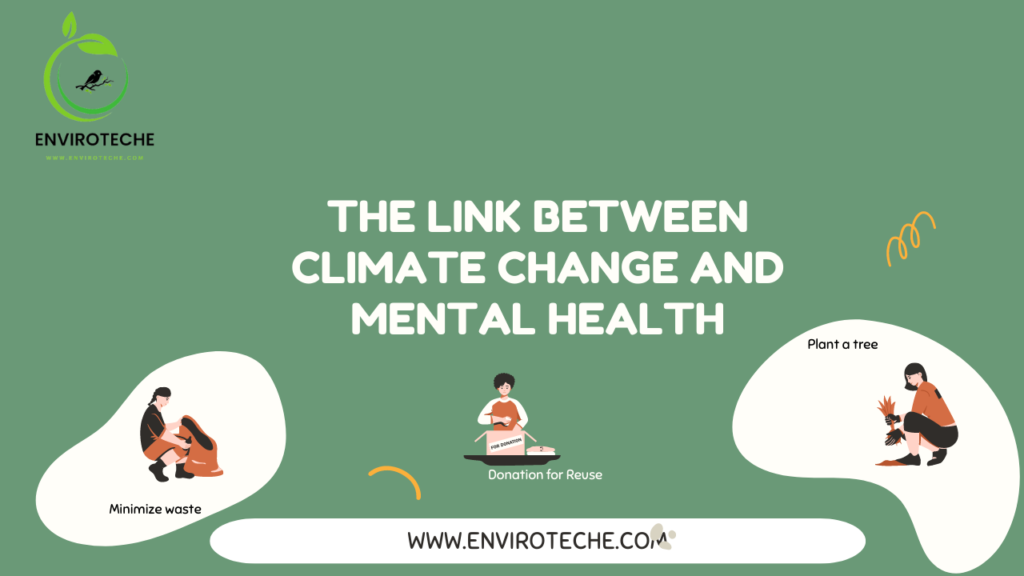
The Link between Climate Change and Mental Health
Shazma Ilyas1, Muhammad Ali Amir1
1Department of Environmental Sciences, Government College University Faisalabad
It is unknown and impossible to forecast how much climate change would influence humans, despite the fact that it is already having an impact on surroundings to varying degrees all across the world. Millions of beachfront mansions with precious and priceless belongings will be scattered across the oceans as many residences burn. The substantial repercussions of climate change, which include more hurricanes, severe droughts, and wildfires, are only partially illustrated by these events. We must look beyond our traditional field of research, which evaluates the physical damages of climate disasters, to also take into account how these calamities may affect us mentally in order to fully appreciate the scale of their potential influence.
Since environmental influences can cause prenatal anomalies, hinder neurodevelopment, even cause intrinsic mental diseases, and trigger neurological and psychosomatic problems, they are more significant in psychiatry. Climate-related extreme events have the potential to be disastrous for human civilization. Disasters differ from seasonal weather changes in the way that they cause different psychological and psychopathological pain, as demonstrated by tornadoes, floods, and droughts. Other climate disasters, such as the increasing acidity of the seas, acid rain, extreme fog, melting of glaciers, and biomass extinction, that are often ignored in study on the mental health of populations exposed to them, may also have a significant influence on mental health.
There is currently a shortage of specific research on how climatic events link to psychiatric illnesses, despite the fact that psychiatry has just lately started to address climate change.
Relationship Between Climate Change and Mental Health
Two different domains may be impacted by climate change:
(1) Physical well-being, which might be impacted by increasing heat stress, mishaps, diseases, and shortages of food.
(2) Community wellbeing may be compromised if local economy suffers, which will have an adverse effect on social structures.
It is generally known that there is a link between catastrophic weather catastrophes, like floods (the most common disasters on a worldwide scale), wildfires, heatwaves, and cyclones, and severely nervous emotions. (e.g., Salcioglu et al. 2007, for example). However, there hasn’t been much study on their long-term impacts. However, it has been found that floods are associated with chronic anxiety and depression, PTSD, greater levels of violence (in children), and potentially even suicide (Ahern et al. 2005).
According to Fritze et al. (2008), Recognizing climate change as a serious environmental threat may result in psychological despondency and ongoing worry. They contend as well that these consequences will significantly affect mental health. Climate change may directly affect mental health by destroying ecosystems and reducing people’s feeling of belonging and connection to the land (Higginbotham et al. 2007).
Eco Anxiety and climate change
The term “eco-anxiety” is used to explain the connection between anxiety and viewpoints on the negative impacts of climate change.
Albrecht first introduced the word “eco-anxiety” to describe a persistent worry of environmental disaster, but it is now also used to refer to mental suffering or anxiety caused by deteriorating environmental conditions or anxiety felt in response to the ecological crisis. Environmental distress can be explained in a variety of ways. For instance, the term “ecological grieving” describes the sadness that results from recent or impending damages in the environment as a whole.
Clayton claims that as children are more prone to suffer from PTSD, depression, and sleep issues as the result of extreme weather events, they are more susceptible to the adverse impacts of climate change on their mental health. Younger people (18 to 35 years old) rated climate anxiety as interfering with their ability to operate more severely than older ones. The general level of concern over climate change was also higher among women and people under 35 than among males and those above that age. Women feel higher levels of stress and anxiety than males do because they engage in more behaviors and are more likely to develop post-traumatic stress disorder (PTSD) in the wake of a tragedy.
The same holds true for those who have seen physical changes to their surroundings as a result of climate change, such as damage or strain brought on by extreme weather events, becoming homeless or relocation as a result of its impacts, or going through the consequences of droughts, rising sea levels, or unpredictable weather. These folks are more susceptible to experiencing greater amounts of stress and anxiety connected to climate change. Women feel higher levels of stress and anxiety than males do because they engage in more behaviors and are more likely to develop post-traumatic stress disorder (PTSD) in the wake of a tragedy.
Here are some tips to help you develop sensible climate change coping methods.
1: Address what you have control over
- Establishing sustainable practices for consumption, recycling, composting, and energy usage.
- Taking part in measures to combat climate change.
- Contacting politicians via phone or letter to request action.
- Selecting foods that have a smaller impact on the environment (e.g., reducing your weekly meat intake, producing your own veggies, etc.).
- Altering your travel to college; having important discussions about climate change with loved ones.
- Donating to causes or organizations you support.
2: Stop reading the climate news
Using environmentally responsible behaviors as one of your climate change coping techniques is one of the best methods to manage and reduce anxiety. A problem-solving mentality, mental restructuring or refocusing, looking for assistance from others, paying greater attention to the issue, and expressive coping are further coping strategies.
Community-Based Strategies for Mental Health and Climate Change
Individual, familial, community, and governmental adaptation to climate change risks will be necessary. Top-down interventions can be identified by programs and activities launched by local, state, or federal public health and environmental organizations.
What can be done about it by governments?
An increasing body of research shows that specific air pollutants are linked to mental illnesses like dementia, depressive disorders, anxiety, and suicide. Dévora Kestel, head of the WHO Department of Mental Health and Substance Abuse, estimates that almost 1 billion people worldwide suffer from mental health illnesses, but that three out of every four of them lack access to the essential therapies. Countries may be able to do more to protect those who are most at risk by stepping up mental health and psychosocial support as part of catastrophe risk reduction and climate action.
The new WHO policy brief suggests five key strategies for governments to use in addressing the effects of climate change on mental health:
- Including environmental factors in mental health programs.
- Combining climate change mitigation with mental health assistance.
- Expanding on international obligations.
- Creating neighborhood-driven strategies to lessen vulnerabilities.
- Closing the large budget gap that exists at the moment for psychosocial assistance and mental health.
Conclusion
Last but not least, climate change has major and largely ignored implications on mental health. Future instances of harsh weather and environmental deterioration might lead to anxiety, depression, and other mental illnesses. Ecophobia is a problem that is getting worse, especially among women, young people, and those who have been directly impacted by natural disasters. Coping techniques can be used by people to handle these issues. Governments should close the funding gap for mental health services and psychological aid and integrate mental health into community-based and climate change activities.
References:
Cianconi, P., Betrò, S., & Janiri, L. (2020). The impact of climate change on mental health: a systematic descriptive review. Frontiers in psychiatry, 11, 74.
Berry, H. L., Bowen, K., & Kjellstrom, T. (2010). Climate change and mental health: a causal pathways framework. International journal of public health, 55, 123-132.
Coffey, Y., Bhullar, N., Durkin, J., Islam, M. S., & Usher, K. (2021). Understanding eco-anxiety: A systematic scoping review of current literature and identified knowledge gaps. The Journal of Climate Change and Health, 3, 100047.
Ebi, K. L., & Semenza, J. C. (2008). Community-based adaptation to the health impacts of climate change. American journal of preventive medicine, 35(5), 501-507.
Check Other Schlorships:


